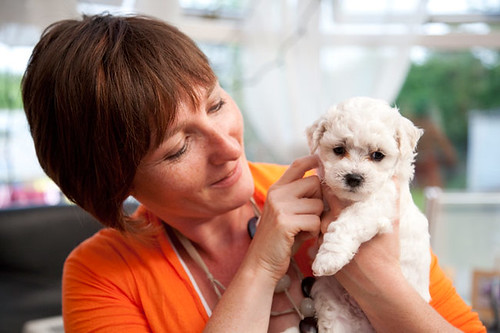The best puppy age for separating your new Bichon Frise puppy from his siblings is no longer what it used to be, and you might be surprised to know the current thinking.
Knowing exactly when to bring home a new puppy, can make a big difference in how your new puppy adjusts to your family and to your home.
Puppies need to stay with their mothers for the first few weeks. And, you might be surprised to learn that it’s also important for them to spend time with their siblings, as well.
Mom’s milk is important for your puppy’s health. And her lessons are critical for your new puppy to learn about being a dog. In addition, your puppy’s interaction with her brothers and sisters, helps her understand her place in the pack.

Your Puppy in His Litter
Puppies are born absolutely helpless. They are blind at birth and their eyes and ears are closed.
For about 2 weeks, all they do is eat (nurse), sleep and occasionally crawl all over their mother and brothers and sisters.
Gradually puppies start to become aware of their world. Young puppies start to hear sounds around them. And soon they start to see light, and then they gradually identify objects.
In time, puppies stay awake longer, and they play with their siblings. And at an early age, puppies start to show their dog personalities—wagging tails, yipping, yelping and poking at mom and the other pups.
By the time your dog is seven weeks old, he has completely developed his own unique personality.
Critical Behavior Period
The time from about 2 weeks to 14 weeks of age is “critical”—it’s actually referred to as the critical behavior period. During this time a young Bichon Frise dog learns how to behave with his mom, his brothers and sisters and, to a limited extent, with people.
At this point, people don’t really play an important part in your pup’s life yet.
A Bichon puppy learns how to relate to other dogs and learns “pack manners”. Mom plays a very important part in this education.
It is at this point that your puppy learns his place in his “pack”. He will be a dominant or a submissive personality. And that won’t change. So, when you pick a puppy, what you see is what you get.
Best Puppy Age for Leaving the Pack and Why…

Most experts believe that a puppy should leave his litter for his new home, when he is between six and eight weeks old.
A few breeders don’t let puppies go to new homes until they are 12 weeks old.
Some say that exactly 49 days is the best time for him to leave the litter. However, most experts believe that the exact timing is not critical.
But, there are some things to consider.
A puppy leaving the pack when he is too young, may miss out on important learning from his mother and his litter mates. He won’t know how to relate to other dogs.
A dog that doesn’t know how to get along with other dogs can become a real problem. Aggressive dogs tend to fight with any other dog, large or small. And sometimes with people.
But, the most important lesson that he misses is one that you probably never thought of.
A puppy too little to leave the pack will not learn how to modify his bite strength. He learns this from playing with his brothers and sisters.
A dog who has not learned to soft mouth other dogs, may hurt you or your children when playing with you.
Puppies in the Litter After 8 Weeks
After puppies reach eight weeks of age, they become more aggressive at combative play.
There is a reason for this. Puppies are now developing a ranking order for their pack. Some will become dominant personalities and they will be confident. Others will become submissive, and they will be shy and fearful.
Personalities at this age start to be irreversible.
Dogs have learned their place in the pack, and they act accordingly.
Kennel Syndrome
Leaving too early or staying too long in the breeder’s kennel has an effect on puppies. When a puppy stays in the litter over 12 weeks, pack behavior is embedded.
This is more of a problem for shy or submissive dogs, but it does affect all the puppies in the litter.

Naturally shy dogs end up having low levels of confidence, and they have trouble making independent decisions.
Dogs who are dominant, become pack leaders within the litter. A pack leader left in the litter past twelve weeks, can be overly aggressive with other dogs and with people.
Unfortunately, dogs left in the litter too long do not learn to fully identify with humans. Socializing your dog can help, but these dogs will not bond as well with you and your family.
Dogs left in the litter past twelve weeks have missed their best socialization period with humans. They often develop a fear of new situations and environments. They can be overly excitable and hyperactive or overly withdrawn and shy.
So, as you can see, it is important to adopt your new puppy when she is not too young and not too old. If you work with a competent Bichon Frise breeder, the breeder will help you know when it is the right time.
If this is your first dog or puppy, you might appreciate a little help with taking care of your puppy and training him. Doggy Dan has an excellent collection of dog training videos that make training your puppy easy as pie! I’ve used quite a few of his tips with my current dog Skipper.

Leave a Reply